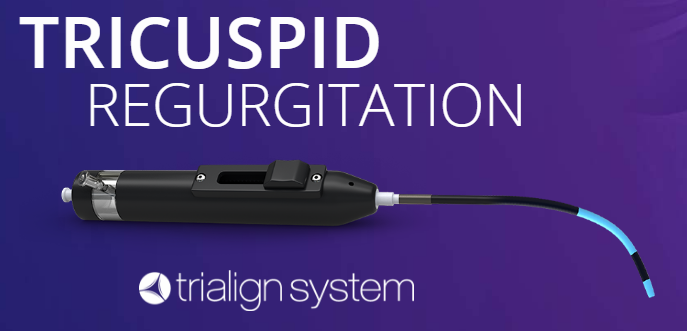Mitralign, Inc., announced today the successful compassionate use treatment of a patient suffering from Tricuspid Regurgitation (TR) due to a cardiac implantable electronic device lead, with their investigational Trialign System.
“We are pleased to be the first center in the world to report treatment of a patient with mechanically induced TR due to their pacemaker lead,” commented Christopher Meduri, M.D., MPH, Interventional Cardiologist at Piedmont’s Marcus Heart Valve Center. “We continually receive referrals for patients looking for treatment of their tricuspid regurgitation, and a substantial proportion of these patients have leads. This large population of patients has a significant unmet need that could potentially be addressed with a less invasive intervention like this.”

(Credit: Mitralign, Inc.).
“We believe this is the first reported patient ever treated with a transcatheter device to relieve TR that was primarily caused by a lead,” said Rick Geoffrion, Chief Executive Officer of Mitralign. “Data suggest that one third of patients with severe TR have one or more leads in their tricuspid valve, which could be more than 1 million patients worldwide. Any transcatheter solution that is intended to treat TR, must address this large population.”
The Trialign System is an investigational device and is limited by Federal (or United States) Law to investigational use only. It is not available for sale or commercial distribution. With the small footprint of the implant, the Trialign System is designed to offer versatility as a frontline solution to address patients with TR. The SCOUT I Early Feasibility Study utilizing the Trialign System is currently enrolling patients in the United States. This patient was treated under the FDA Compassionate Use Exemption.
About Tricuspid Regurgitation (TR)
Tricuspid regurgitation occurs when the tricuspid valve fails to open and close properly, causing blood to flow backwards into the right atrium. If left untreated, TR can lead to heart enlargement and heart failure. In the U.S. and Europe alone, there are an estimated 7.2 million patients suffering from TR1.
It is estimated that 50% of patients with mitral regurgitation have moderate to severe tricuspid regurgitation2. The annual incidence of patients with TR is increasing with an estimated 220,000 patients in the US, and 330,000 patients in the EU developing moderate-severe TR each year1. Despite the large prevalence of patients, TR is generally untreated by surgery with approximately 10,000 tricuspid valve surgeries performed annually in the US3. Annuloplasty repair is the most used technique for tricuspid valve surgery and represents 90% of the current volume. Isolated tricuspid valve surgery is particularly rare representing only 10% of current procedures while the remaining 90% are performed in conjunction with other left-heart surgeries3, 4. Permanent pacemaker (PPM) or implantable cardioverter defibrillator (ICD) lead placement has been shown to increase the frequency and/or severity of TR in multiple reports5-11.




